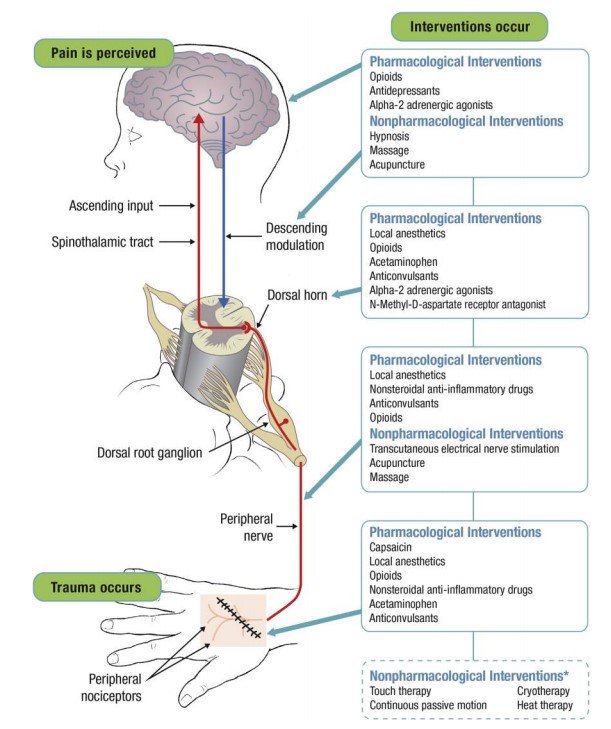Pain is expected after your oral surgery procedure. It varies significantly between patients, and it can be hard to predict exactly what your level of pain will be. Most people have a recovery period of 3-5 days, however, that does not necessarily mean that there will be no pain after this period. Many people report taking pain medicines for over 7 days.
To help manage your pain, a combination of medicines will be used. Each medicine targets pain at different points on the pathway from the surgical site to your brain. By combining pain medications, we are targeting pain at multiple points along the pain pathway.

During your surgery and in the immediate post-operative period, local anesthetic will provide pain control by numbing the surgical site. It generally provides relief for an additional 30-60 minutes after the completion of your procedure. There is a new local anesthetic on the market that claims to provide relief for up to 3 days after your surgery. If you are interested in receiving this, please let your oral surgeon know during your consult.
The workhorse of post-operative dental pain management is NSAIDs. Numerous studies have shown that they provide superior pain relief compared to opioids. This group of medicines include ibuprofen (Motrin, Advil), naproxen (Aleve), ketorolac (Toradol), meloxicam (Mobic), and celecoxib (Celebrix). NSAIDs work by addressing both pain and inflammation at the surgical site. They are relatively safe when used as directed with their main side effect being gastrointestinal (GI) problems. They should not be used if you have a history of GI ulcers or kidney problems. If you develop heart burn post-operatively, please contact your oral surgeon.
Another common medication used for dental pain is acetaminophen (Tylenol). Acetaminophen is thought to block pain signals in the brains. Like NSAIDs, they have few side effects but should be used with caution in patients with liver problems. The other problem with acetaminophen is that it is used in many over the counter (OTC) medicines and opioids, so care should be taken not to take more than 4000mg in a 24 hour period from all sources. Based on your medical history this maximum daily dose may be less than 4000mg.
The third most commonly used pain medication are opioids – codeine, tramadol, hydrocodone, oxycodone, morphine, fentanyl. It would be hard to listen to the evening news without hearing about the opioid epidemic our country is facing. Side effects of opioids include nausea, vomiting, dizziness, sleepiness, constipation, respiratory depression, tolerance, and addiction. However, opioids do provide pain relief and an opioid may be prescribed to supplement NSAIDs and/or acetaminophen. The current recommendation for prescribing opioid pain medication is up to a three day supply after surgery. They should only be taken as prescribed (as with all medications) and should be used with caution when combined with other medications that cause drowsiness (benzodiazepines, Benadryl, alcohol, etc.). Dr. Raju only prescribes the following opioids – tramadol and codeine. Please note that almost all opioids (besides tramadol) are combined with acetaminophen. You should not drive while taking an opioid.
The most common pain regimen Dr. Raju has is the following. It may vary depending on your medical condition(s), so please contact your surgeon before starting a pain regimen.
| First 48 hours | After 48 hours | |
| Ibuprofen 200mg (OTC) | 3 tablets every 6 hours | 2 tablets every 4-6 hours as needed for pain |
| Acetaminophen 325mg (OTC) | 2-3 tablets every 6 hours | 2 tablets every 4-6 hours as needed for pain |
| Tramadol 50mg OR
Tylenol with Codeine |
1 tablet every 6 hours as needed for pain | |
- Please purchase over the counter ibuprofen 200mg and acetaminophen 325mg when you pick up your prescriptions! They are the CORNERSTONES of post-operative pain management!!!
- Taking ibuprofen 600mg and/or acetaminophen 975mg 1 hour before surgery can decrease your post-operative pain. If you are getting IV sedation, these medications may be taken with a small sip of water.
- Post-operatively take pain medication with food.
- You may take all three pain medications at the same time safely unless instructed otherwise.
If you still do not have pain relief or develop adverse side effects with the above regimen, contact Dr. Raju.